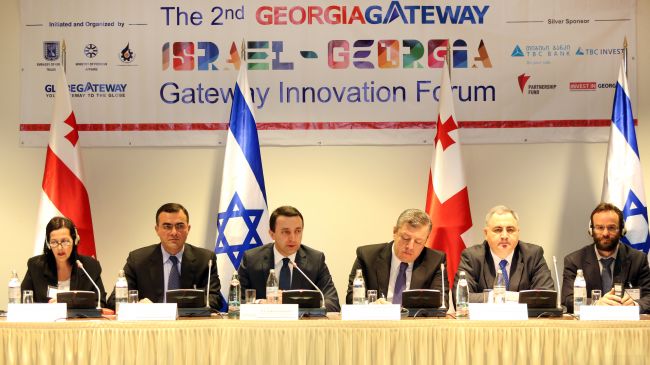Eric Livny, Director of ISET, served as a keynote speaker at the Israeli-Georgian business forum, "Georgia Gateway," that was organized by Israel Gateway and the Embassy of Israel on March 12, 2014. The forum was officially opened by Irakli Gharibashvili, the Prime Minister of Georgia, Giorgi Kvirikashvili, the Minister of Economy and Sustainable Development, Irakli Kovzanadze, the CEO of The Partnership Fund, and Lasha Zhvania, former Georgian ambassador to Israel and Minister of Economy. Conducted for the second consecutive year, the forum brought together Georgian and Israeli Hi-Tech businesses in the communication and IT sectors together with colleagues from the Partnership Fund and other relevant Georgian government agencies.
Eric emigrated to Israel as a child in 1977 and he chose this year as the starting point of his analysis. In 1977 Israel was only 29 years old, not much older than Georgia in 2012. Four year earlier the country has barely survived a surprise attack by a coalition of Arab states led by Egypt and Syria – the so-called Yom Kippur war. In 1977, Israel also went through the first democratic transition in its history after 29 years of an effective one party rule by MAPAI.
Evoking potential parallels with Georgia, Eric spoke about how Israel went from growing oranges in 1977 to becoming one of the most technologically advanced countries in the world. The story of Israel’s transformation was well described in a global bestseller “Start-up Nation: The Story of Israel's Economic Miracle ” by Dan Senor and Saul Singer. In Russian, the book was published under a different title “A Nation of Smart People” (Нация умных людей). However, in 1977, these very people were engaged in arguing with each other, fighting their neighbors and growing oranges. More than 50% of the GDP was produced by inefficient state enterprises behind a high protectionist wall. In early 1980s, the Israeli economy went into a spiral of strikes and nearly collapsed under the yoke of a 3-digit hyperinflation.
The change came in the early 1990s.
The natural smarts, hutzpah and entrepreneurial drive were channeled into innovation with the arrival of computers and the Internet. The new liberal policy framework and privatization unleashed competitive forces. No longer protected, firms were forced to innovate. Innovation was supported by academic institutions, the state and venture capitalists, many of whom were Israelis living and working in the US. The military provided “convertible” technical skills and networking – whole army-trained teams went on to establish startup companies. Brain circulation furnished the talent; mass emigration from the USSR – the well-trained and disciplined workforce.
Georgia today is not much different from Israel of 1977. It has the creative talent and a powerful diaspora on which to rely for funding and international networking. Even though its own workforce needs further development, Georgia enjoys one of the most liberal policy regimes, exceptional on a global scale for its welcoming of “foreign guests” (“stumari”, as any foreigner is referred to in Georgia) – programmers, engineers and managers, corporate lawyers, teachers, and expert farmers. Georgia’s location is far superior to that of Israel; it has plentiful water and energy resources. And last but not least, in the past 10 years, Georgia has already demonstrated its capacity for leapfrogging whole stages in economic, social and political development.
Speech of Prime Minister of Georgia At the 2nd Georgia-Israel Innovation Forum











